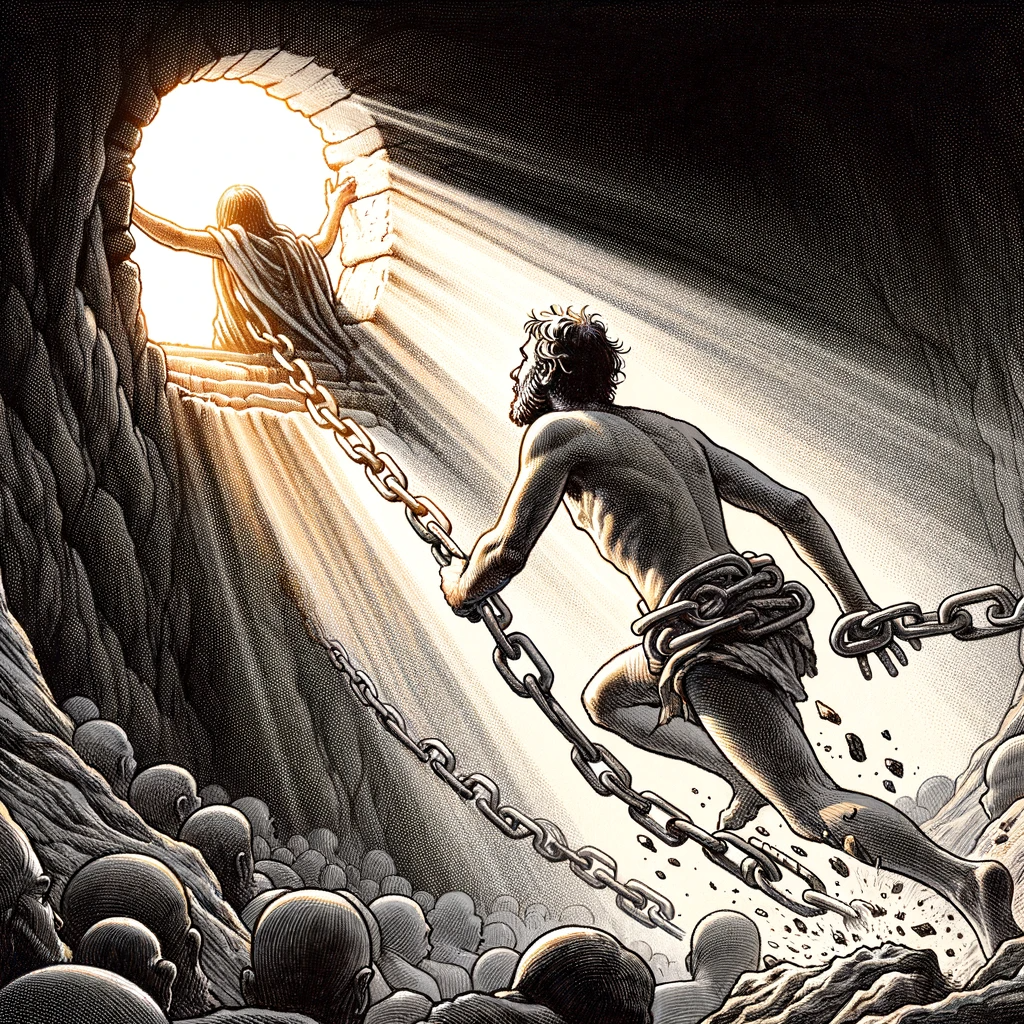Walk with Confidence: Confronting Your Fears with Plato's Cave Story
In the journey of personal growth, there are few cool stories to help you not only to begin trusting yourself, but also to break limitations set by previous generations. Plato’s ancient story has been passed down through generations, inviting us to confront the fears that have been holding us back within our own comfort zones. This story has helped me understand that If I want to make permanent changes in my life, it will always start with me. You can’t look around and ask for help when the people around you can’t even help themselves. Welcome to the story of building trust, and trusting your gut-feelings.
Plato's Allegory of the Cave - Part One
The Cave as a Comfort Zone: Imagine people who have lived their entire lives in a dark cave, chained so they can only see the cave wall in front of them. They've never seen the outside world.
Shadows as Reality: Behind them is a fire, and between the fire and the prisoners, objects pass by. These objects cast shadows on the wall. The prisoners think these shadows are real objects because they have never seen anything else.
Breaking Free: One day, one prisoner breaks free, climbs out of the cave for the first time ever. At first, he's confused and the sunlight hurts his eyes. He struggles to understand his new surroundings.
Seeing the Real World: As his eyes adjust, he starts to see things as they really are, not just shadows. He realizes the sun and the outside world are the real reality, not the shadows in the cave.
Going Back to Help: He goes back to the cave to tell the others, but they don't believe him. They're used to the shadows and think he's making it all up, making fun of him and calling him crazy. Sound familiar?
In Simple Terms:
The cave is like living in a small, familiar world. The shadows are like the things we think we know, but there's so much more out there. Breaking free means learning new, sometimes uncomfortable truths. But once you see the real world, you can't unsee it, even if others don't believe you.
Plato's Allegory of the Cave - Part Two
After seeing the real world, the freed prisoner realizes how limited and false the life in the cave is. Excited and wanting to help his fellow prisoners, he goes back to the cave to share his new knowledge and experiences.
Returning to the Cave: When he returns, everything in the cave is dark compared to the bright outside world. It's hard for him to see in the darkness again.
Trying to Convince the Others: He starts telling the other prisoners about the real world he has seen. He talks about the sun, the true forms of objects, and how the shadows on the wall are not real.
Resistance from the Prisoners: But the other prisoners don't believe him. They have never seen the world outside, so they think he is either lying or has gone crazy.
Fear and Mockery: They become scared and angry. They mock him and say that going out of the cave has ruined his eyesight. They refuse to be freed and resist any attempt to be dragged out of the cave.
Refusal to Change: The story shows that people often fear and resist change, even if it could lead to a better understanding of the world.
In Simple Terms:It's like when someone learns something new and tries to share it, but others are too comfortable with what they know. They might be scared or think the new ideas are silly, so they stick to their old ways.
Plato's Thoughts
Plato suggests that we are all prisoners of our own beliefs and perceptions. The real world, represented by the outside world, is full of new ideas and experiences, but it can be challenging and even painful to accept.
This is really Important - Why was Plato’s mentor executed?
Socrates, plato’s mentor, got in trouble and was put to death for two main reasons:
Bad Influence on Kids: Some people thought Socrates was teaching young people ideas that were not good. He asked lots of questions that made people think differently than they used to, and this made some important people in the city upset. They were losing control of the mass.
Not Believing in the City's Gods: Socrates was also in trouble because he didn't believe in the same gods as everyone else in Athens, Greece. He talked about his own ideas of what is right and wrong, which were different from the city's traditional beliefs in many gods.
In the end, Socrates had to drink a poison called hemlock as a punishment. His death is remembered as a very important event because it shows how asking questions and thinking differently can sometimes upset people in power. Sound familiar?
My Motivational Speech For You!
Plato’s Cave teaches us that our comfort zone, like the cave, often limits our understanding of the vast and beautiful world outside. Just as the prisoners in the cave mistook shadows for reality, we too might be viewing only a small part of what's truly possible in our lives. The journey of the prisoner who steps out into the light, despite the initial fear and discomfort, symbolizes the courage needed to embrace new perspectives and experiences.
Similarly, Socrates’ life reminds us of the importance of questioning and seeking truth. He bravely stood by his beliefs and encouraged others to think critically, even when it was unpopular or risky. His commitment to his principles, despite the challenges, shows us the value of staying true to ourselves and our journey towards self-discovery and authenticity.
As a life coach, I encourage you to see yourself in these stories. Like the prisoner stepping out of the cave, trust in your ability to face the unknown and discover a brighter, more authentic world.
Embrace the spirit of Socrates by daring to question and think deeply about your path.
Remember, the first step might be scary, but it's the start of a journey towards a more enlightened and fulfilling life. Trust in yourself, for within you lies the strength to overcome fears and the wisdom to shape your destiny.
Your Turn to Reflect:
Have you ever experienced a moment in your life where you felt like you were stepping out of a 'cave'?
Can you recall a time when confronting your fears led to significant personal growth?
In what ways do you think embracing discomfort can lead to a more authentic and fulfilling life?
A Community of Growth:
Mogressive is not just a platform; it's a community. A community that thrives on shared learning, mutual support, and the courageous act of stepping into the unknown, together. So, let's make this more than just a conversation; let's make it a starting point for growth and discovery.




